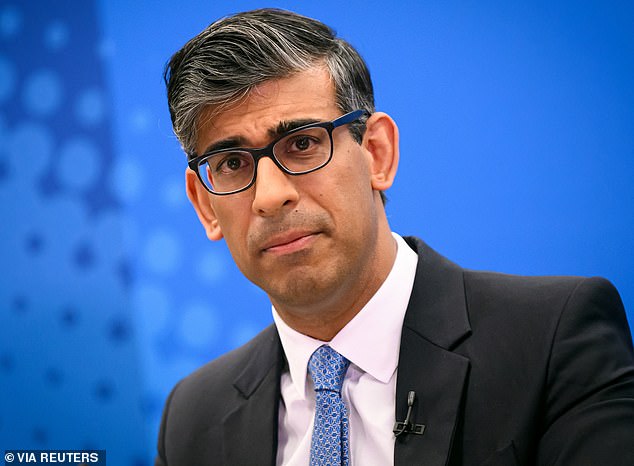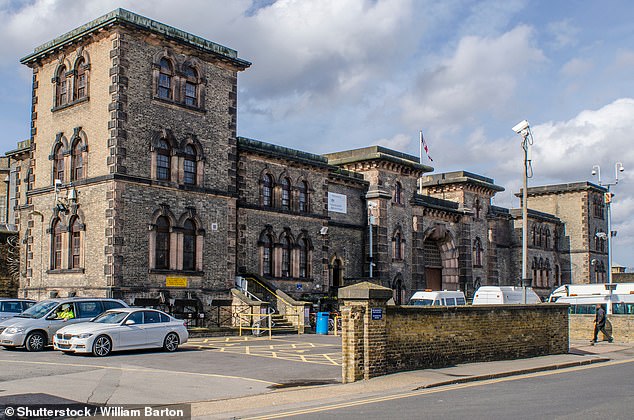Britain’s prison system was on the brink of collapse on three occasions while Rishi Sunak was prime minister, according to a damning report.
Dame Ann Owers, a former chief inspector of prisons, found the criminal justice system had been ‘in crisis’ for more than 18 months under the Tory government.
In her review, commissioned by Labour‘s Justice Secretary Shabana Mahmood, Dame Ann revealed that senior officials even feared riots if jails ran out of space.
She also disclosed that top civil servants ‘were so concened’ about a breakdown that they kept ‘an audit’ of all decision-making and documents in case of a future inquiry.
Following Labour’s general election victory in July 2024, Ms Mahmood implemented a new early release scheme in order to tackle prison overcrowding.
This saw her cut the proportion of a sentence that inmates must serve behind bars from 50 per cent to 40 per cent.
But prisons in England and Wales are still around 98 per cent full. HM Prison and Probation Service says it cannot run the estate efficiently at over 95 per cent capacity.
In her report, published today, Dame Ann described an 18-month ‘permacrisis’ in the criminal justice system while Mr Sunak was in Downing Street.

Britain’s prison system was on the brink of collapse on three occasions while Rishi Sunak was prime minister, according to a damning report

Dame Ann Owers, a former chief inspector of prisons, found the criminal justice system was ‘in crisis’ for more than 18 months under the Tory government. Pictured: HMP Wandsworth
Dame Ann criticised the previous Tory government for only doing ‘just enough to avert breakdown and buy time until the next predictable cliff edge was reached’.
She revealed how, in May 2024 following the announcement of the general election, senior officials discussed ‘contingency plans in case the criminal justice system collapsed during the election campaign because prisons were unable to take in any more prisoners’.
‘This could involve invoking emergency powers under the Civil Contingencies Act 2004 to release prisoners early, in order to avert the risk of public disorder,’ she added.
‘The risk was real: at one point there were fewer than 100 places in adult male prisons.
‘However, the system had in fact been in crisis for over eighteen months. From 2023 onwards, prisons were running very close to the edge of capacity.
‘On three occasions, this was only pulled back at the last minute by the use of early release schemes, gradually decreasing the amount of time many prisoners spent in custody, using powers designed to allow release on compassionate grounds.
‘Senior officials were so concerned about a potential breakdown in the criminal justice system that an audit was kept of all decision making and documents, in case there was a public or parliamentary inquiry.’
In a further criticism of the previous government’s handling of the crisis, Dame Ann continued: ‘Although departmental ministers were convinced by mid-2023 that some form of early release was both necessary and urgent, this required Prime Ministerial agreement, which was not forthcoming until the system was within three days of potential collapse, and only in incremental stages.’
She also said that, while conducting her review, many of those she spoke to ‘expressed frustration and sometimes anger at the reluctance to accept and then act on the well-documented and imminent crisis, or to agree any coherent plan to avert it’.
‘Many believed that the default position was to do as little as possible as late as possible, with the consequence that the system repeatedly reached the brink of collapse, rather than accepting the inevitable and getting ahead of the crisis,’ Dame Ann added.
In October 2023, then justice secretary Alex Chalk announced some ‘less serious offenders’ could be freed from prison up to 18 days before their automatic release date.
This was then increased to 60 days in March 2024 and then to 70 days in May 2024.
Ms Mahmood said: ‘This report lays bare the disgraceful way the last Conservative government ran our prisons.
‘They added less than 500 cells to the prison estate over 14 years, released over 10,000 prisoners early under a veil of secrecy, and brought our jails close to total collapse on countless occasions.’
Andrew Neilson, the director of campaigns at the Howard League for Penal Reform, said: ‘This review into prison capacity spells out in forensic detail how the Government has found itself facing the prospect of running out of cells.
‘It is a crisis, or more accurately a series of crises, that has been brewing over several decades and across successive governments.’
A Conservative Party spokesman said: ‘In office, the Conservatives rightly listened to the public demand to see criminals punished with proper sentences, and to tackle the capacity issues we had plans to use prisons abroad.
‘Labour scrapped those plans and instead chose to release violent criminals back on our streets.
‘Labour aren’t serious about tackling these issues. They blocked our deportation bill that would have mandated the deportation of all foreign criminals.
‘Whilst Labour and Reform want shorter sentences, the Conservatives will make no apology for ensuring that heinous criminals are kept off our streets and behind bars.’












